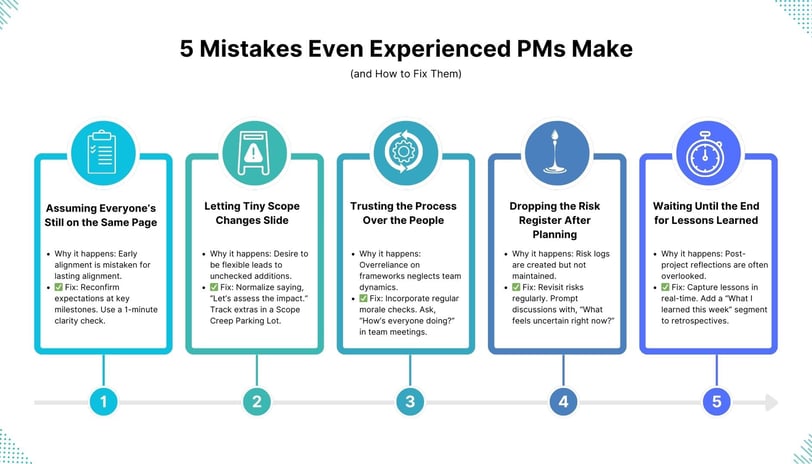5 Mistakes Even Experienced Project Managers Make (And How to Fix Them)
This post breaks down five common slip ups even seasoned project managers make, like letting scope creep slide or missing signs of team burnout. You’ll get quick, practical fixes to stay sharp and keep your projects on track.
Iyanna Trimmingham
5/6/20253 min read


Did you know that up to 85% of projects fail due to preventable missteps - many of them made by experienced project managers who never even saw them coming?
As shocked as I was by that piece of information, let’s be real…
Just because we’ve been managing projects for a while doesn’t mean we don’t still slip up. In fact, some mistakes become easier to make the longer you’ve been doing it, because:
We lean on what’s worked in the past.
We skip steps we think are “locked in.”
We trust the process - but forget to check the people behind it.
I’ve seen it. I’ve done it... and I’ve learned from it.
In this post, I’m breaking down five common mistakes even seasoned PMs still make, and how to fix them before they derail your project. I’ve also included PMI-recommended practices to give you the kind of advice I wish someone had emphasized sooner.
Mistake No. 1: Assuming Everyone’s Still on the Same Page
You kicked things off strong - clear goals, aligned stakeholders, a killer kickoff meeting. Fast forward a few weeks and… confusion.
Why it happens: You assume early alignment = lasting alignment.
What PMI says: Stakeholder engagement should be continuous, not front-loaded.
How to fix it: Make alignment a habit. Reconfirm expectations at key milestones and shift from “assume” to “ask.”
Tip: Drop a 1-minute clarity check into meetings:
“Is anything unclear or shifting that we need to recalibrate on?”
Mistake No. 2: Letting Tiny Scope Changes Slide
One tweak. One small feature. One “quick ask.” You say yes - until that yes turns into two extra weeks of work and a team that’s stretched thin.
Why it happens: You want to be flexible and supportive.
What PMI says: Even small scope changes need to be formally assessed.
How to fix it: Normalize saying, “Let’s assess the impact.” If it’s worth doing, it’s worth tracking.
Tip: Create a “Scope Creep Parking Lot.” Track low-impact requests and revisit them after core deliverables are complete.
Mistake No. 3: Trusting the Process Over Trusting the People
Your framework is solid. Your plans are clean. But the team’s energy is Off. Tasks stall. Communication slips.
Why it happens: We get so focused on execution, we forget about connection.
What PMI says: Processes should be tailored to the team and project environment.
How to fix it: Check in on people, not just progress. Culture, morale, and communication drive delivery more than a timeline ever will.
Tip: Add a quick “how’s everyone doing?” pulse check to your retros or standups. It creates space for the real blockers to surface.
Mistake No. 4: Dropping the Risk Register After Planning
You did the risk assessment. Built the matrix. Assigned owners.
And then… it disappeared into a shared drive folder, never to be seen again.
Why it happens: As momentum builds, it’s easy to deprioritize what “might” go wrong.
What PMI says: Risk identification and monitoring should happen throughout the lifecycle - not just at the start.
How to fix it: Bring risks back to the table—frequently.
Tip: Ask your team, “What feels uncertain right now?” That one question can surface more risk than a spreadsheet ever will.
Imagine this: A PM overseeing a $2M software rollout never updated the risk plan. When a key developer quit, their backup had left six weeks earlier - and no one knew.
💡 Lesson? Risks don’t age well.
Mistake No. 5: Waiting Until the End for Lessons Learned
Now the team’s drained. The client’s gone quiet. The post-mortem slides are half-baked, and everyone’s moved on.
Why it happens: We treat lessons learned like an afterthought instead of an ongoing feedback loop.
What PMI says: Knowledge management is most effective when insights are captured throughout the project, not just at the end.
How to fix it: Build “mini reflections” into your process. Short, regular recaps create long-term improvement.
Tip: Add a “What I learned this week” column to team check-ins or sprint reviews. Keep it light, but consistent.
Experience Doesn’t Cancel Out Growth
Here’s the truth: You can have 10+ years of experience and still fall into these traps. What separates great project managers isn’t perfection, it’s self-awareness, adaptability, and course correction.
We don’t outgrow the fundamentals. We just get better at spotting when we’re drifting from them. So, the next time one of these mistakes creeps into your process, don’t beat yourself up. Fix it. Adjust. Keep moving.
Have you bumped into any of these mistakes lately?
Download the free Scope Creep Survival Kit template to help you say no (or not yet) with confidence.

